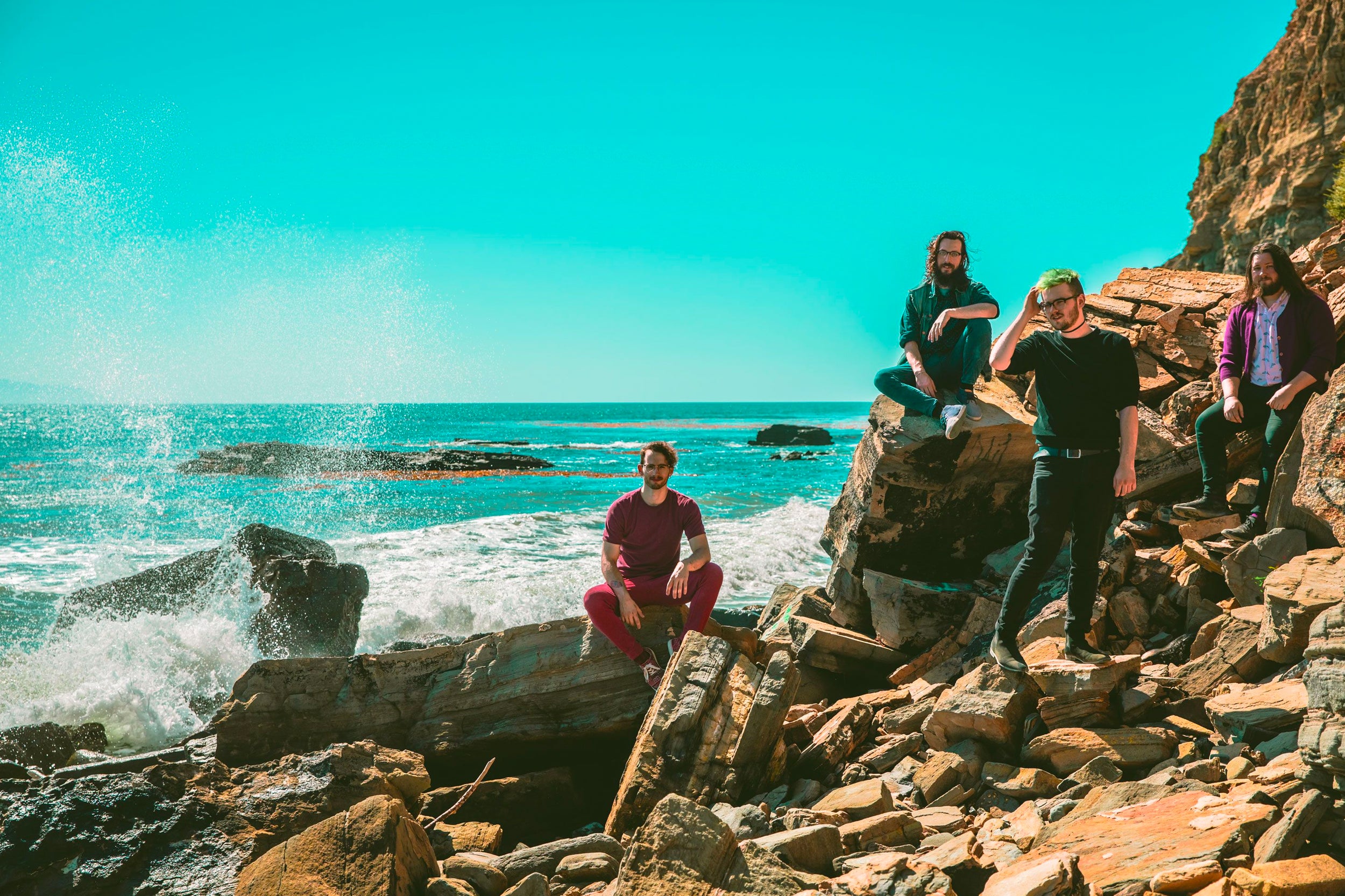
Cart
0Spend $75 for free domestic shipping
Your cart is empty

Your cart is empty
SUBTOTAL:
$0.00

When a whale’s corpse falls thousands of feet to the ocean floor, it’s preserved by the frigid water, becoming the site of life and activity for deep-sea organisms: in its death, the hulking creature creates a rich new ecosystem that can last for decades. This phenomenon is called a whale fall. Precisely halfway through plastic death, the upcoming second full-length album from glass beach, lies the band’s own “whalefall.”
There’s good reason for glass beach’s centering of this song. It embodies a significant thematic motif of plastic death, a stunning, transformative creation that pulls from indie rock, jazz, prog, hardcore, metal, experimental, and beyond. It’s a complete, uncompromising, playful work of art; every corner and crevice of the record’s 13 tracks, each arrangement and timbre and texture, is alive with intention and possibility. “This album is the Pacific garbage patch: cultural trash strewn together seemingly by accident, standing in stark juxtaposition to each other,” says frontperson and primary songwriter J McClendon.
The opening track, “coelacanth,” begins as a lo-fi home demo of bassist Jonas Newhouse playing piano over a barely intelligible conversation between lead guitarist Layne Smith and their roommate, before building into a gorgeous polyrhythmic crescendo, evoking the minimalism of Steve Reich and Phillip Glass. As the song unfolds, drummer William White launches the band into climactic cacophony, culminating in a disorienting series of chord hits. “coelacanth,” much like its namesake—a fish that was thought to have been extinct for millions of years—heralds the band’s return after having functionally disappeared for nearly five years since the release of the first glass beach album, which had grown a cult fanbase for its unflinching depiction of queer life as mediated through social media, its oversized ambition, and its scrappy yet adventurous production.
Upon returning from their first tour, the band, eager to work on new material, would find their plans halted by a global pandemic. While trying and mostly failing to make progress on the new album over Discord and Zoom calls, the band struggled to figure out how to proceed. They released “1015,” a hyperpop-influenced single about the 2008 recession, wrote the song “running” as a prospect for the third Bill and Ted movie (which would ultimately be rejected), let their fans vote on songs for them to cover, and performed virtual concerts in Minecraft, all while J wrote demos at home.
These demos would finally be realized as the band moved into a house together mid-lockdown to isolate and work. The next three years proceeded as a relentless process of writing and rewriting, always attempting to serve the music and its themes while pursuing originality and avoiding anything that felt like a default choice. “It’s not a matter of, ‘What’s the best decision?’ It’s, ‘What is the decision that only we would make?’” says McClendon. The record was tracked between the band’s house and their shared practice space. McClendon and Smith engineered and mixed the sessions, and Will Yip mastered the record. McClendon admits that it was difficult to force themselves to stop laboring over the songs. “I like to explore all possibilities with songs,” they grin. “I think that’s why it takes so long.”
plastic death expands the band’s experimentation with dynamics and composition. Trumpet, trombone, violin, and even marimba dance and bloom alongside the band's own creative and dextrous instrumentation. The rage and chaos of “slip under the door” snaps into the acoustic dream of “guitar song,” in a transition that nods to Abbey Road. “I like playing really soft, slow, beautiful stuff, and also the harshest, ugliest thing you can do,” says Newhouse. “It’s cool that we’ve found a group of people where we can just have fun doing that over and over again.” McClendon says the contrasting poles give meaning to one another: “Having both extremes makes them both feel more real to me.”
The record’s sole single, “the CIA,” is a dark, dancy, post-punk/jazz hybrid, a coordinated, breathless braid of synth and saturated guitar. The song’s tension and confusion explode into a brutal modern metal climax to close the track, flickering with glitchy production zaps and razor-sharp stops. Every track on plastic death is similarly rich with detail.
McClendon’s lyricism on prior glass beach releases was direct and explicitly narrative, but now takes a more abstract approach, borrowing from the surreal multilayered language of Finnegans Wake, the poetic slogans of Jenny Holzer’s Truisms, and dadaist Tristan Tzara’s method of pulling random combinations of words from a hat. McClendon explains, “It shifted from trying to tell a story to trying to subtract everything but the emotion, whatever words get to the emotion.”
Much like the bioluminescent “abyss angel” on the cover, the album often lurks in the dark depths of the sea. Still, the band feels this is ultimately an optimistic and cathartic record. “By the end of it, it’s like a weight has been lifted off your shoulders,” says Smith. “I would like people to come away feeling like it’s going to be okay,” adds Newhouse.